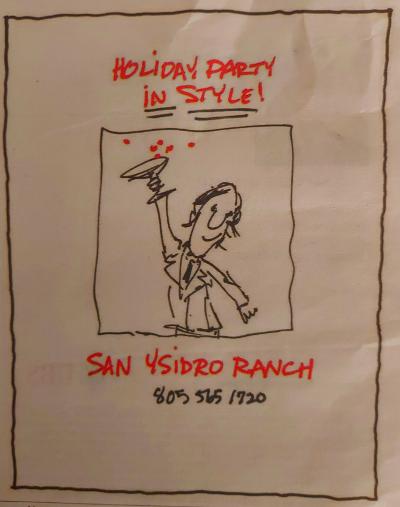CULINARY COUP . . . Fine Dining Restaurant Luce at InterContinental San Francisco Reopened with New Executive Chef Rogelio Garcia on October 8, 2021 Chef Rogelio Garcia Debuts 8-Course Tasting Menu, Exquisite Contemporary California Cuisine with Hints of Latin American & European Flavors Fine dining restaurant Luce at InterContinental SF Hotel in downtown San Francisco officially reopened with new Executive Chef Rogelio Garcia on Friday, October 8, 2021. Chef Garcia joined the Luce team following Executive Chef positions at 1 Michelin-starred Spruce (SF), Angèle (Napa), and Traci Des Jardins' The Commissary (SF), as well as being Chef de Partie at 3-star Thomas Keller's The French Laundry (Yountville). Chef brings a refined technique to his tasting menu that's at once opulent, inventive, and comforting to the palate. Luce presents an idiosyncratic wine program carrying the prestige of the "Best of Award of Excellence" from Wine Spectator magazine. Luce garnered international acclaim upon receiving 1-star from the Michelin Guide with Chef Dominique Crenn (2010) at the helm of the kitchen; one of the world's premier women chefs. Under the stewardship of Chef Daniel Corey, Luce maintained its Michelin star for 10 consecutive years until its 2019 closure due to the Covid-19 pandemic. Chef Garcia takes the reins after curating singular menus at San Francisco Bay Area's finest restaurants; as well as an appearance on Bravo's Top Chef. Born in Mexico City and raised in Los Angeles and Napa by a single mother, Chef Garcia rose to acclaim on an untraditional path to becoming one of San Francisco's rising star chefs. With no formal training, Chef Garcia entered the restaurant industry at age 16 and has risen the ranks on his pursuit of culinary distinction. He first moonlighted as a dishwasher at a Yountville hotel restaurant during his high school years. While raising two sons who were both born before Garcia turned 20, he remained steadfast in his determination to reach his greatest dreams. Over two decades, Garcia cooked and staged at Hurley's (Napa), Angèle (Napa), Redd (Yountville), Calistoga Ranch, and Michael Minna (SF) before landing a cooking position at Cyrus (Healdsburg), then The French Laundry. Today, Chef Garcia designs an elegant tasting menu at one of the city's foremost downtown restaurants. Luce (meaning "light" in Italian) reopens as the modern American cuisine mecca it's garnered an indelible reputation for by serving exquisite dishes with seasonality and sustainability at the heart of their identity. Chef Garcia crafts dishes with great intention to the delight of diners, and to celebrate the bounty of local ingredients procured from select purveyors. Over the years, Garcia has developed close partnerships with farmers at the CUESA's Ferry Plaza Farmers Market including: Tenbrink Farms, K and J Orchard, Dirty Girl Produce, Zuckerman Farms, Tsar Nicolai Caviar, Rue @ Forsman Ranch, Chefs Warehouse, Ports Seafood, Hook to Fork, The Joint Seafood, and Flannery Beef. Ingredients sourced directly from these purveyors are exclusively featured on Luce's opening 8-course tasting menu. The Chefs Tasting Menu at Luce opens with Castelvetrano Sourdough and Milk Bread (Vermont Cultured Butter) and ventures next to French Perlita Caviar (Lime Crème Fraiche, Corn). Entrée dishes include Early Girl Tomato Gazpacho (Sun Gold Tomato, Lemon Olive Oil, Alaskan King Crab), Blue Fin Tuna (Galia Melons, Avocado), Japanese Oak Grilled Hawaiian Kampachi (Sacramento Calrose Rice, Golden Chanterelles), Wild Alaskan Halibut (Eggplant, Jimmy Nardelo, Sauce Vin Blanc), Pistachio Crusted Duck (Turnips, Mission Figs, Gizzard Port Reduction: pictured above), and Japanese Oak Grilled Australian Wagyu (Tuscan Kale, Australian Black Truffle, Oxtail Raviolon). Desserts include Tenbrink Farms Stoneftuit (Pavlova, Crème Fraiche), and Warm Dark Chocolate Torte (Caramel). Luce welcomes diners Thursdays through Sundays for seating between 5:30pm - 9pm. The 8-course tasting menu is $145 (vegetarian menu is available upon request), and a 4-course menu is $95.
___________________________________
(16).jpg)
CAULIFLOWER GRATIN 
An easy and delicious fall or winter dish made with cauliflower that the whole family will love. Most ingredients were purchased at Trader Joe’s or Bristol Farms. 
INGREDIENTS:
- 2 1/2 slices of Brioche bread, torn into small pieces
- 2 tablespoons grated Parmesan cheese
- 3.5 tablespoons butter
- 1/4 cup all-purpose flour
- 2.5 cups milk
- 1 large head cauliflower, cored and cut into small pieces
- salt and ground pepper to taste
- 3.5 ounces Gruyere cheese, grated
Directions: Preheat oven to 350 degrees. In a food processor, combine bread and Parmesan. Pulse until coarse crumbs form, about 3 to 4 times; set aside. In a large saucepan with lid, melt butter over medium heat. Add flour; cook, whisking for 1 minute. Slowly add in milk. Add cauliflower, and season with salt and pepper. Bring to a boil, then reduce to a simmer. Cover, and cook until cauliflower begins to soften, approximately 5 minutes. Remove from heat; slowly stir in Gruyere. Pour entire mixture into 2-quart baking dish, sprinkle with breadcrumb mixture. Cover with foil and bake until cauliflower is easily pierced with a fork, about 20 minutes. Remove foil, bake until breadcrumbs are golden and brown, about 20 additional minutes. 
Recommend serving with pork chop entrée and organic applesauce. _____________________________________________________________ California restaurants sue to recover regulatory fees, saying they saw no payback under COVID restrictions
Photograph: Shutterstock The Pantry Los Angeles Restaurants in five counties of California have sued to recover the permitting and tourism fees they paid while their operations were restricted by government directives aimed at combatting COVID-19, saying they were denied the benefits, according to the group’s legal representative. The fees targeted in the actions include what the operators were assessed by the state and local governments for health permits, liquor licenses and other regulatory charges, as well as mandated contributions to various tourism-promotion funds. The plaintiffs allege they should not have been charged for services and privileges that were of no use to them while their dining rooms were closed or operating at reduced capacities, said their counsel, the law firm Kabateck LLP. Kabateck said the plaintiffs are acting in concert and intend to have their complaints certified as a class action. Operators in three more counties are about to join their ranks, according to the firm. “Restaurant owners are obligated to pay these government fees just to operate, yet the same government entities who have collected those fees have forced these businesses to close their doors or drastically restrict operations due to the pandemic,” said Brian Kabateck, an attorney with Kabateck. “We simply want the government to return those fees to those restaurants who followed the law and closed.” The firm indicated in the announcement that the actions have the support of the California Restaurant Association (CRA). “Easing fees would help enable establishments to stay open and keep vulnerable workers employed,” it quotes Jot Condie, EVP of the CRA, as saying about the recovery effort. The restaurants that filed suit are located in several of California’s most populated areas, including Los Angeles, San Diego, Monterey, Sacramento and Orange Counties. Their law firm said actions will soon be filed by establishments in San Francisco, Fresno and Placer Counties. The suits are the latest examples of operators pushing back on government efforts to re-shut dining rooms and lower indoor seating capacities as brakes against the current surge in new COVID-19 infections. A group of restaurateurs and bar operators in Illinois, for instance, have pledged to defy recent directives from Gov. Jay Pritzker to suspend dine-in service in six of 11 regions that were set up to track and address the pandemic on a more localized basis. They have formed a private Facebook group dedicated to that civil disobedience. Restaurants and bars in a number of other areas have also turned to county and state courts in hopes of thwarting renewed restrictions on their operations. Tavern owners in Wisconsin, for instance, brought a legal action that resulted in a judge temporarily staying an order from state health officials to cap restaurants’ dine-in capacities at 25% of the seating. Tavern owners in Arizona unsuccessfully sued to prevent Gov. Doug Ducey from halting bars’ indoor service. Restaurants and bars in Pennsylvania had worked with the state legislature in a failed attempt to curb Gov. Tom Wolf’s ability to set capacity limits. The Democratic governor subsequently offered to help the state’s operators by suspending their liquor licensing fees for 2021, a measure Wolf said would save the industry $20 million. The effort drew a mixed reaction from the Pennsylvania Restaurant and Lodging Association (PRLA). “While our industry desperately needs support, these olive branches will not sustain businesses that are still reeling from closures, shrinking revenue, and well-intended but ineffective mitigation efforts unnecessarily targeting restaurant operators,” association CEO John Longstreet said in a prepared response. “For example, the $20 million in licensee fee waivers only accounts for 2021 fees, does not provide relief for 2020 fees, and only amounts to about $1,500 per licensee, which doesn't compensate for the daily losses in revenue licensees are facing under the current orders.” California sports more restaurants than any other state in the nation. Report from Restaurant Business News. 
|





